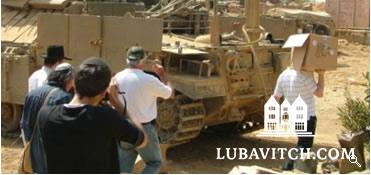Few people in Israel have faith in the cease fire, many are even angry about it. They question the steep price they paid for a nebulous outcome instead of what they hoped would be a definitive triumph over terror. Some are emerging from the shelters gingerly, still shaken by their month-long ordeal. Others have lost no time returning to their homes. Though many are skeptical and think it’s only a matter of time before trouble in the region starts up again, “they feel like they’ve been released from prison,” Chabad’s Rabbi Baruch Wilhelm of Nahariya told Lubavitch.com. “They’ve been freed from 30 days in the shelters,” and in this city, within hours of the cease fire, shops were opened, the roads were full again, and pedestrians were walking the streets.
But as the dust settles after a month of relentless terror, many are faced with emotional and psychological debris that cuts far deeper than the worst of the property damage. In Akko, for the family who two weeks ago lost both father and daughter by a Hizbollah rocket when they stepped out of the shelter to survey the damage from a katyusha, the healing will be a lifelong project. For the parents of the two brothers also killed by a rocket, no amount of rebuilding will restore their losses. “These families need a lot of support now,” says Rabbi Natan Oirechman, Chabad representative to the city, who has been with them all along.
Rabbi Menachem Kutner, director of Chabad’s Terror Victims Program, has been inundated with calls and referrals from hospitals and government agencies. “We sent notices out that we will address all outstanding needs of patients that will not be administered by medical insurance or state allowances,” he says. The needs are often comprehensive: one woman –a single mother of two has been hospitalized with serious shrapnel wounds to her entire body. “She’s got two children to care for but will not be able to go back to work when she’s released from the hospital. We’re going to take care of her and her children.”Sometimes, the need is less comprehensive but no less important. Kutner shows me a fax he just got from a hospital in Safed. It’s a request for transportation for a soldier who is recovering from back surgery after being wounded in Lebanon. “The State has given him an allowance for bus transportation,” says Rabbi Kutner. “He just went through surgery on his back, and he lives in the south!”
The thought of allowing this soldier to take city buses back home after surviving the war and undergoing surgery, makes Kutner shudder. “There’s no way we would let him take city buses back home. We sent a car for him.”
In Tiberias, another one of Israel’s large northern cities, returning residents are less sanguine about resuming normal life. “This economy here depends on tourism,” explains the city’s Chabad Rabbi Yosef Kramer. But few tourists are venturing to Tiberias now. “Many residents are not returning—with no tourism, they have no businesses to come back to.” While Rabbi Kramer distributed food to the shelters and residents whom remained throughout the war, the need has only grown since, he says, and will now open a soup kitchen. “It will take a long time before people are back on their feet again.”
The struggle is compounded, Kramer admits, by the trauma. “You need to understand what all these weeks in a shelter did to people, to the children.” The constant sirens and the rockets have frazzled nerves and left many children traumatized. Many will require counseling and psychological help in the weeks and months ahead.
In all, 2, 773 civilians were treated for shock and trauma by the 3,790 katyushas that hit Israel’s northern cities since July 12. Police reports say 42 civilians were killed by these rockets, and more than 4,000 were treated in hospitals for injuries.
In many of the cities, no one knows yet whether or when schools, which in Israel typically open in August, are opening. Uncertainty abounds, but for the moment, most residents of Israel’s northern cities, frazzled nerves and all are relishing the chance to come up for air.

Be the first to write a comment.